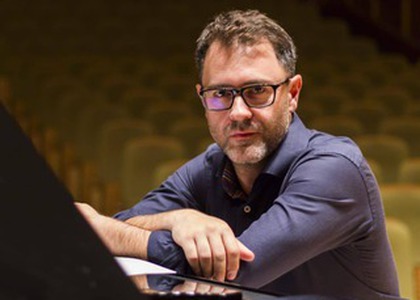> [Archived] Interviews

Interview with pianist Stefan Doniga
The pianist Ștefan Doniga will give a series of recitals under the title "The Bortkiewicz Experiment", presenting for the first time to the public in Romania an original concept realized in a new format. We learn more details from the musician in an interview given to our colleague, Ioana Țintea.
Mr. Ștefan Doniga, between February 27th and March 9th, you are proposing to the Romanian public a new tour, entitled "The Bortkiewicz Experiment". To begin with, I would like you to describe to us the idea behind this unique concept that you are presenting for the national premiere.
Music is a part of our life, it is a part of the truth around us and this is how I want to present it. This is where the idea of this experiment actually starts because it is not only a technical experiment, but it is, first and foremost, an approach experiment from the public. It is a challenge that I address to the public, to understand the music as I was telling you, more than as a reason to be in a concert hall and enjoy it aesthetically.
What aspects prompted you to turn to portray Ukrainian composer Sergei Bortkiewicz?
First of all, I have a very close, long-lasting, and gratifying connection with Serghei Bortkiewicz, overtime of course, because already 15 years ago I made the world premiere recordings of two piano concertos, in 2005-2008; they were discovered almost 80 years after their composition. We put these masterpieces on CD and they had considerable market success, they are still sold all over the world, which is why we have maintained a very good relationship with the Netherlands Music Institute in Hague, who actually do all this research in the direction of of the discovery of Serghei Bortkiewicz's creation. And in this way I got very close to the creative genius of Bortkiewicz because it is an extraordinary value - he was a very famous composer at the beginning of the 20th century - but also to his life story, which is really a Hollywood story. And in this way, I approached this creator, without a chance during his lifetime, because he was persecuted everywhere he lived, but, behold, with a chance in posterity and in history.
What works did you include in the tour program?
This portrait of Bortkiewicz starts from the watermark to reach a major perspective, I would say, on his image. I start with three mazurkas, Mazurcile op.64, which I actually compare to three Chopinian mazurkas because I want to place Bortkiewicz in the genre. I introduce the master of the genre, Chopin, and then compare it to Bortkiewicz's mazurkas to see how well it can stand up to Chopin's compositional level.
I then move on to Sonata No. 1 for piano, an absolutely monumental work that encompasses almost a hundred years of musical history. Part I is clearly tributary to Schumann, the second is Liszt, and the third is a combination of Schubert and Dvorak.
And then I continue with what is actually the technical experiment of this project itself, namely a concerto for piano and orchestra that I will present with the orchestra in a playback version because I own the recordings of the orchestra from the time that I made the prints for the disc and I kept some prints that the "Janaèek" Orchestra from Ostrava made to help me work. Being a world premiere, I had no benchmark, I didn't know what this music should sound like. And I use these orchestral negatives that I manage in real time, from the laptop, while I play the score live on the piano.
It will be a unique technical experiment as far as I know, at least for the scenes in Romania and also for the public, I am convinced, for the way the music can be understood. Because it has an extraordinary meaning in this concert that I am playing. It is called "Per aspera ad astra", Through suffering to light. Consider that it was composed by a Ukrainian composer almost a hundred years ago.
Unfortunately, that's what a powerful symbol it represents even for the present moment.
So, start the tour on February 27th, at Piatra Neamț. Which cities will you be in by March 9th?
I have a trajectory between friends. Piatra Neamț, then, on March 1st, in Focșani, at the Municipal Theater "Gheorghe Pastia". Then I go to an unusual place, but with a beautiful emotional charge and with an audience very avid for beautiful things - the Athenaeum in Tecuci, for March 2nd. On March 6th, I will be in Galați, in front of the students from the "Dimitrie Cuclin" High School. On March 7th, I am in Brăila and on March 9th I finish in Giurgiu.
Translated by Georgiana-Carmen Rădulescu,
University of Bucharest, Faculty of Foreign Languages and Literatures, MTTLC, year II
Corrected by Silvia Petrescu














